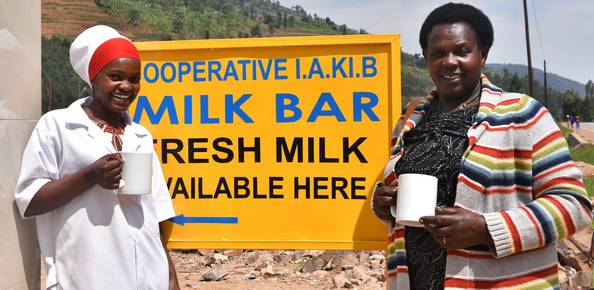FAO's SUPPORT
Among its activities aimed to support women in benefitting more equally from agrifood value chains, FAO has implemented a project under the FAO Multipartner Programme Support Mechanism (FMM) and provided technical assistance and policy support to improve rural women's access to local, national and global markets.
Capitalizing on FAO's knowledge and expertise, the project has provided technical assistance and policy support in selected value chains:
- Dairy in Kenya, Rwanda and Ethiopia.
- Fisheries in Burkina Faso, Côte d’Ivoire, Ghana and Tunisia.
- Horticulture in Ethiopia.
- Roots and tubers in Côte d’Ivoire and Ghana.
- Small-scale cross-border trade of agriculture products in Rwanda.
- Promoting access market for women cassava processors in Côte d’Ivoire.
APPROACH
The project implementation was based on three main work streams:
- Strengthening the capacities and involvement of women in agrifood value chains.
- Supporting institutions and promoting gender-sensitive value chains.
- Producing knowledge products and advocacy tools.
OUTPUTS AND IMPACT
Strengthening the capacities and involvement of women in agrifood value chains
The Project has supported the development of women's capacities in rural small-scale value chains, mainly through collaborating with women's associations, cooperatives, unions and farmer groups. Several activities have been implemented to enhance knowledge and skills of women in selected value chains: training, knowledge-sharing study tours, and specific support aimed at improving market-oriented production and value addition, enterprise development, business-to-business linkages and access to finance.
Supporting institutions and promoting gender-sensitive value chains
Activities were carried out in close collaboration with ministries and national institutions at national and local levels, in order to reinforce their capacities in addressing gender inequalities and providing efficient services for women in agrifood value chains. Advocacy workshops and presentations are organized for policy and decision-makers in Ministries of Agriculture, while Trainings of Trainers were organized for national extension services to ensure the sustainability of capacity development efforts.
Producing knowledge products and advocacy tools
The experience and lessons learned from the project have fed into the development of tools and knowledge products – such as the guiding framework Developing gender-sensitive value chains and training materials – that enable policy and decision makers to formulate and implement gender-sensitive agrifood systems. Advocacy tools, such as brochures and presentations featured at regional and international fora, were also developed for the advocacy and sensitization of policy and decision-makers.


